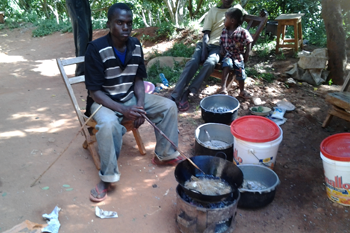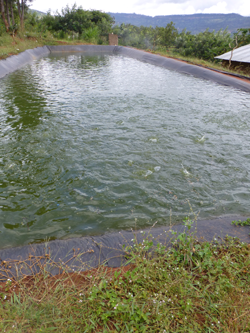ABM Archive Website
THIS WEBSITE CONTAINS ARCHIVE MATERIALS FOR HISTORICAL REFERENCE ONLY
For up-to-date information, including our latest appeals, news, and resources, please visit our current website.
Fish in a Dry Area
The following story has been adapted from a case study written by Jenifer Mutua, ADSE.
 |
| Musau Kombo cooking fish for his customers at Kanoto Market. ©ABM/Beth Snedden 2014 |
Musau Kombo is 47 years old and married to Alice. They have been blessed with four girls aged between , in form one, class seven, class four and class two. They live in Kalawani location in Mbooni District in Makueni County, and until recently was one of the poorest areas in the region. The Kenyan Anglican Development Services Eastern (ADSE) has been working with the members of the Kalawani Community Based Organisation (400+ members) for the last three years, and Musau and his wife are a part of this.
One of the strategies ADSE is using within this community to tackle poverty and drought is to establish sand dam structures across river beds to provide year long water supplies. Musau is a member of the Kalawani CBO, and one of the self-help groups that form the CBO. His Mumbuni Water Project group helped build the Kwa Mutuku Sand Dam that was funded by ABM, and he also helps maintain the dam. Usually the river has no water in the dry seasons, and there is no water for drinking, farming or care of animals.
The water from the sand dams have also been used to fill large fish farm ponds in the community, and one of these is located on Musau’s land. After helping build his fish farm, Musau was a recipient of initial fingerling stock and fish food. He and others in the community were trained in managing the pond and keeping the fish healthy, as well as how to market the fish, and how to cook it.
Fish has not been a part of the Kalawani diet until recently, and with the success of the four fish farms the community now has a diversified and more nutritional diet. Musau is now regularly harvesting fish and selling at his small shop in the nearby village. Since his first fish harvest in February 2013 he has been selling at least ten fish a week, and this has provided him with a steady income of about $20 per week.
 |
| A fish farm. ©ABM/Beth Snedden 2014 |
ADSE carries out other community activities as part of the poverty alleviation strategy for this area. The new sand dams also provide water for year-round farming on the land near the rivers. With the change in climate the twice yearly rainy seasons tend to be shorter, and crops do not receive as much direct rain. Now the community has a number of sand dams from where they can obtain extra water.
Farmers are being taught different farming techniques for the drier conditions, and shown the benefits of new low-cost technologies such as (low water) drip irrigation, ‘zai’ (trench) pits for planting seedlings, and drought resistant seeds. Musau and other farmers like him, can plant drought-resistant vegetables to eat and even to sell during drought periods.
Musau and his wife are also members of the Mbooni Village Savings and Loans group (VSL), started by ADSE to provide a way for the community to be able to save and borrow larger sums of money. Before the intervention in this community, people did not have extra money to be able to save.
Since the intervention of ADS-Eastern in the area, they have been able to start Village Saving and Loaning Schemes which helps to save the little money they get, receive a loan, repay back and incase of any emergency like sickness and school fees one is able receive a social fund which they will repay back within a certain period of time with no interest.
Through support of water structures like sand dams and fish ponds, this farmer has benefitted a lot. He was one of those who participated in construction of Kwa Mutuku Sand dam funded by ABM through ADS Eastern.
In Musau’s village, 4 of fishponds were established, as a strategy to diversify the dietaries and for diversification in the area. Musau was one of the beneficiaries through this initiative and as trained and his fishpond stocked with fingerlings. Musau has been harvesting fish and selling at a small shop in his village. Since Musau started the harvesting of fish in February 2013, he has being selling one fish at 100 to 150 shillings. Per week he harvests a minimum of ten fish. So since then he has being selling every week a total of 1,500 shillings.
The money he gets from the sale of fish helps him buy farm inputs, paying school fees for his children in school and save for contribution to village savings and loaning scheme. People in the area are happy with this technology because they never used to eat fish before but now they can access fish which is a rich source of proteins for the adults and children.
< Back


